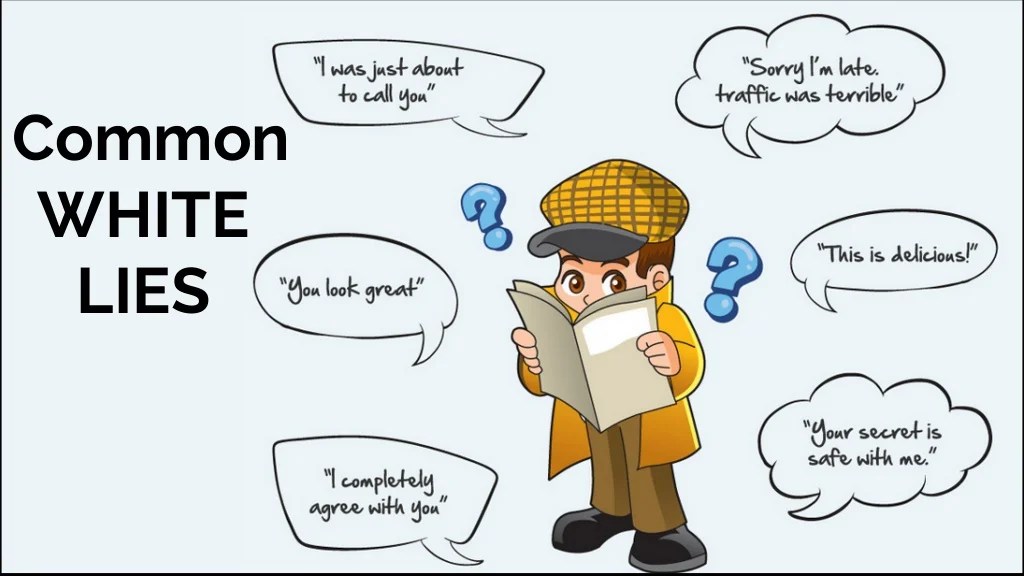Unraveling The Truth: Fascinating White Lie Examples
In our daily lives, we often find ourselves navigating a complex web of social interactions, where honesty and kindness sometimes collide. White lies, those seemingly harmless fibs we tell to spare someone's feelings or avoid discomfort, play a significant role in these interactions. Although they may not hold the same weight as more serious untruths, understanding white lie examples can shed light on the intricate balance between honesty and compassion. From everyday scenarios to celebrity encounters, white lies can take many forms, often revealing our intentions to maintain harmony, protect feelings, or simply avoid awkward situations. This article explores a variety of white lie examples, their implications, and the fine line we tread when we choose to tell a small, seemingly innocent falsehood.
As we delve into the world of white lies, we’ll examine their presence in various contexts, including relationships, social gatherings, and the workplace. Are white lies always harmless? Or do they sometimes lead to unintended consequences? By exploring these questions and presenting relatable examples, we hope to foster a deeper understanding of this intriguing aspect of human communication. Join us as we uncover the layers of meaning behind white lies and discover when they might be appropriate or problematic.
Whether you’ve told a white lie to avoid hurting a friend’s feelings or found yourself on the receiving end of a fib, these little untruths are more common than we might think. They can serve as a tool for smoothing over social interactions, but they can also raise ethical dilemmas about honesty and transparency. In the following sections, we will delve into specific white lie examples, dissect their motivations, and discuss the potential ramifications of our choices. Let’s embark on this journey of understanding together!
What Are White Lies?
White lies are minor untruths told to avoid hurting someone's feelings or to evade an uncomfortable situation. Unlike more significant lies, they are typically considered innocuous and even well-intentioned. Common examples might include complimenting someone’s cooking, even if it wasn’t to your taste, or telling a friend that their new haircut looks great when you think otherwise. The motivation behind white lies usually stems from a desire to protect or comfort others.
Why Do People Tell White Lies?
The reasons behind white lies can be varied and complex. Here are some common motivations:
- To protect feelings: Preventing emotional pain for someone else.
- To avoid conflict: Maintaining peace in a relationship or social situation.
- To be polite: Upholding social norms and etiquette.
- To create a positive atmosphere: Encouraging joy and positivity among peers.
What Are Some Everyday White Lie Examples?
Everyday life is filled with opportunities for white lies. Here are some relatable examples:
- “I’m busy that day,” when you just want a night to yourself.
- “It’s the thought that counts,” when receiving a gift you don’t like.
- “You don’t need to lose weight,” when a friend expresses concern about their appearance.
- “I love your outfit!” when you really don’t.
How Do White Lies Impact Relationships?
White lies can have both positive and negative effects on relationships. On one hand, they can strengthen bonds by fostering an environment of kindness and support. On the other hand, repeated white lies can lead to distrust if the truth eventually surfaces. It’s essential to strike a balance between honesty and compassion in our interactions with others.
Can White Lies Be Harmful?
While many white lies are harmless, there are instances where they can lead to complications:
- Breaking trust: If someone feels deceived, it can damage the relationship.
- Creating confusion: Miscommunication can arise when the truth is eventually revealed.
- Encouraging avoidance: Relying on white lies can prevent honest conversations that might be necessary for resolution.
What Are Some Famous White Lie Examples?
Even celebrities are not immune to the allure of white lies. Here are a few notable instances:
- When asked about their age, some celebrities might respond with a vague answer or a playful fib.
- A star might claim they love all their fans equally, even if they have favorites.
- Public figures often downplay their struggles or challenges to maintain a polished public image.
What Should You Consider Before Telling a White Lie?
Before telling a white lie, it’s critical to weigh the potential consequences:
- Is the truth necessary for the person’s growth or well-being?
- Will the white lie lead to more significant issues down the line?
- Am I prioritizing kindness over honesty in a way that feels right?
Are There Alternatives to White Lies?
In situations where honesty may hurt, consider these alternatives:
- Offering constructive feedback instead of a vague compliment.
- Expressing your feelings honestly but gently.
- Changing the subject to avoid discomfort without lying.
When Is It Best to Be Honest Instead of Telling a White Lie?
While white lies can be well-intentioned, there are times when honesty is the best policy. Examples include:
- When someone's safety is at risk.
- When the truth can lead to personal growth or better decision-making.
- When the relationship is built on a foundation of trust that should be maintained.
Conclusion: Navigating the Fine Line of Truth
White lie examples are woven into the fabric of our social interactions, serving as a testament to our desire to maintain harmony and protect the feelings of those around us. However, as we’ve explored, the motivations behind these small untruths can lead to complex outcomes. By understanding when a white lie may be appropriate and when honesty is essential, we can navigate our relationships with more empathy and awareness. Ultimately, the goal is to foster connections that are built on mutual respect, kindness, and, when necessary, the courage to tell the truth.
Exploring The Thrills Of All Maze Runner Films
Shining Bright: A Look At Blonde Actresses Under 30
Finding Humor In Darkness: The Orphan Joke Phenomenon

